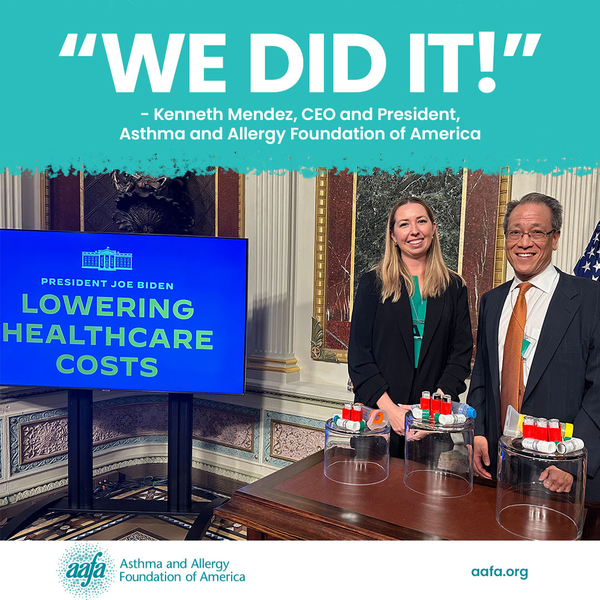We did it! We took awareness of asthma inhaler pricing all the way to the White House!
The Asthma and Allergy Foundation of America (AAFA) has been pushing to lower the costs of asthma and allergy medicines, including inhalers. We know the high cost of medicine can be a barrier to treatment.
AAFA joined President Biden and Senator Bernie Sanders in April 2024 for a briefing on health care costs and inhaler pricing.

The White House invited AAFA President and CEO Kenneth Mendez and AAFA Senior Director of Policy and Advocacy Jenna Riemenschneider in recognition of our advocacy work to advance health equity for people with asthma.
As a result, some major asthma inhaler manufacturers announced $35-a-month caps on out-of-pocket costs. The price cap will apply to people with commercial/private insurance or no insurance.
See What You Need to Know About the $35 Price Cap on Asthma Inhalers for information from each manufacturer offering the price cap, including where to find savings cards and information on patient assistant programs.
AAFA is leading the way to reduce health care costs for people with asthma
"On behalf of the 27 million people in the United States with asthma, we appreciate the leadership of President Biden and Senator Sanders to bring down costs for asthma treatments. Pricing announcements made in March by some manufacturers of inhalers will mean lower costs and improved access to asthma medicine for many people with asthma starting this June,” said AAFA President and CEO Kenneth Mendez. “As President Biden indicated, more can and should be done. It’s not just drug companies, others need to step forward. We welcome continued efforts to improve affordability and accessibility of these essential medicines so all patients can get the treatment they need.”
AAFA continues to raise the voice of the patient community and draw attention to the ways America’s complex drug pricing ecosystem makes asthma medications more expensive for people who need them most. Drug manufacturers, pharmacy benefit managers, insurers, employers, and the government must work together to improve affordability and access.
Access to affordable drugs is a critical component of reducing racial disparities in asthma. Black and Hispanic individuals not only experience higher rates of asthma but also are more likely to be uninsured or underinsured. Deaths due to asthma – although decreasing overall – occur at a much higher rate in the Black and Puerto Rican populations than in the White population. Black individuals are nearly three times as likely to die from asthma than White individuals.
For other ways to save on asthma medicine, see our guide, "What to Do If You Can't Afford Your Asthma Medicine," and the GoodRx Asthma Inhaler Savings Guide.
Last fall, AAFA shared patient stories and its Asthma Disparities in America report with the Senate Health, Education, Labor, and Pensions (HELP) Committee which then launched an investigation into the high price of asthma inhalers early this year.
AAFA’s research indicates that when the cost of medicine becomes a barrier to treatment, people with asthma resort to rationing or simply discontinue use.
Access to asthma medicine can save lives, reduce hospitalizations, and lower the more than $82 billion in annual costs to the U.S. economy from this chronic disease. But the U.S. health care system is complex, and often leaves patients with few affordable options.
Stay in the loop - get news and advocacy updates straight to your inbox with our e-newsletters.


Comments (14)